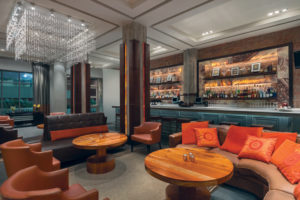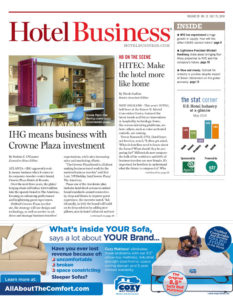ATLANTA— To make a restaurant profitable in today’s environment, it’s essential to create an F&B concept that is accessible, inviting and relevant. Also important are design, ambiance, an element of surprise and, perhaps the most important attribute: quality of food and service. “You need to create an atmosphere that hotel guests want to participate in, and one that will attract local clientele for lunch and dinner. The menu has to be crafted around an unfulfilled need in the market,” said Kevin Richards, COO/hotels, Legacy Ventures. Additionally, the atmosphere should be one that makes guests want to leave their rooms and be a part of the greater scene. Legacy currently has more than 1,000 employees working with 24 restaurants across the nation.
What Legacy and other service providers like them have noticed is that some hotel restaurants are not moneymakers in their current model. “I think too often, the F&B is treated as an amenity and not a profit center,” said Brian Bullock, COO/restaurants, Legacy Ventures. “Sales managers are too quick to give away F&B to sell rooms. This definitely needs to happen sometimes, but not as much as we have seen during our takeovers at the hotels.”
When speaking about the ingredients that make a successful F&B operation, Bullock stressed the importance of making F&B more than simply a guest convenience. According to Bullock, this can be done in many ways. “Running the F&B department as a profit center, not an amenity, is key. Another thing is having all sales managers get approval before they can give away or discount any F&B. This really makes everybody think about giving it away,” he said. In other words, when F&B is awarded for free, it makes the restaurant appear less desirable.
However, Legacy Ventures offers anything but the “same-old, same-old” dining experience, Richards explained. “We don’t use a cookie-cutter approach. We design our projects to enhance the neighborhood we do business in, and we are unique in our design approach to make the project special,” he said.
According to Richards, there are several reasons why boutique and mid-sized F&B operations are not as successful as they could be—and it mostly entails the balancing act between hotel and F&B managers, which he said needs to be sorted out. Two factors in this equation are when the food arrives and the feel of the restaurant. “If the concept portrays to the guest that it’s just another hotel restaurant, they’ve already missed the mark. If the concept is too trendy, once the initial ‘buzz’ wears off, there is no substance to the character of the operation, and local guests do not return,” he said.
When it comes to the ideal F&B venue and the guest experience that comes along with it, David Marvin, founder/president, Legacy Ventures, explained that it should include an active bar offering, an enjoyable dinner experience and efficient banquet and room service. “F&B offerings should be of quality and as seamless as possible,” he said. He warned, though, that quality and seamlessness can be compromised when F&B is managed by different operators.
Legacy Ventures comes in where others have failed. One such case is Legacy acquiring the F&B operations at the Glenn Hotel after other operators couldn’t get it right. According to Richards, the former operators couldn’t cut it because they weren’t delivering quality food on a consistent basis and the concepts were trends that eventually fizzled out. “After that point, F&B struggled and compromised its standards even more, and revenues continued on a downward spiral,” he said.
After Legacy stepped in, the hotel’s F&B outlet, Glenn’s Kitchen, created a recipe for success by designing a menu with craft beverage choices that could be executed in a small kitchen, said Richards. And the hotel’s small kitchen and modest amount of meeting space added to the success: The meeting space in the hotel makes small groups feel comfortable in a functional space. “We compete with some great hotels in the Atlanta market; however, a meeting for 10-15 people in our competition can get lost in the shuffle,” he said.
When determining what a brand’s F&B strategy will be, it is crucial to study the market to get an understanding of what concepts are performing well, said Richards. For example, the small spaces at Glenn’s Kitchen might not work in another hotel. Identifying the needs that are not being satisfied in the market is a strategy Legacy Ventures uses. As an example, Richards said, “At the Hilton Garden Inn Atlanta Downtown, the hotel sits directly across from the Aquarium. So what better to have than one of the top seafood restaurant concepts in the country?” Legacy Ventures decided that its Boston venture, Legal Sea Foods, would be a good fit.
Better profits can be garnered when a new company comes in to shake up the business, according to Richards. Such is the case of Skylounge, a rooftop bar in Atlanta. “Prior to taking over the operation, Skylounge was being marketed by a third party that did not have the best interest of the overall hotel operations in mind,” he said. When Legacy took over, they re-conceptualized the bar, which offers views of Atlanta’s downtown skyline and Centennial Olympic Park. Richards continued, “It is now known as a great place to come for cocktails and overlook the skyline while taking a selfie or having a private event with catered food from Glenn’s Kitchen, which has become a profitable venture.”
According to Marvin, the branded restaurants in the company’s roster are a success in the industry because they are well-known and well-liked brands that bring people and volume which, in turn, bring profitability and quality to F&B. The restaurants include: Ruth’s Chris Steak House, Legal Sea Foods and Marlow’s Tavern. “Having an alluring, busy restaurant enhances the full-service hotel guest experience. Brands can help bring customers into a hotel’s restaurant,” said Marvin. He explained that customers want quality food when they stay in a hotel because of the convenience and prestige it brings.
Legacy Ventures works with several hotels, including Embassy Suites, as the owner/operator with leased restaurants; DoubleTree by Hilton as the owner/operator with both leased and self-managed restaurants; Marriott Autograph Collection as the owner/operator with self-managed restaurants; Hilton Garden Inn as the owner/operator with self-managed restaurants; and Hyatt Regency as the asset manager.
Bullock described Legacy Ventures as “a one-stop shop for components of hospitality. We have in-house design, construction, marketing, hotel and F&B operations. Specifically for the F&B side, we operate it as a restaurant company and not an amenity for the hotel,” he concluded. HB


